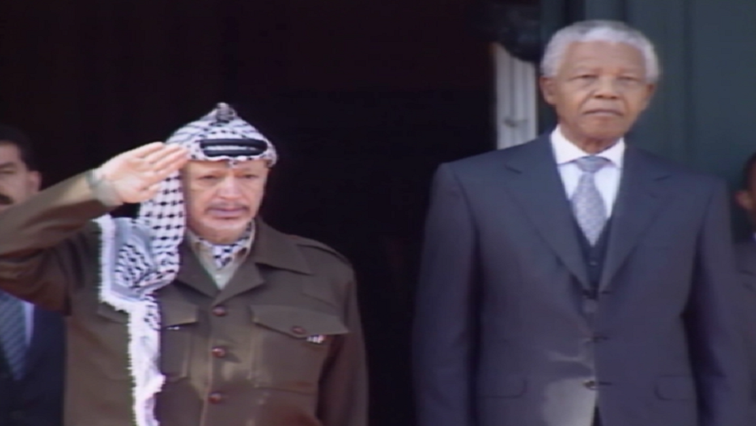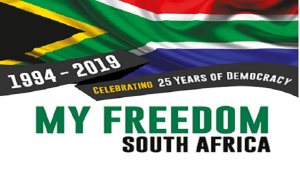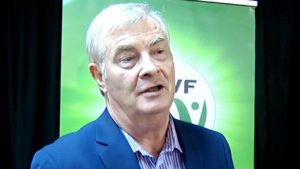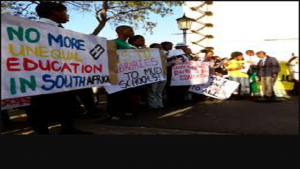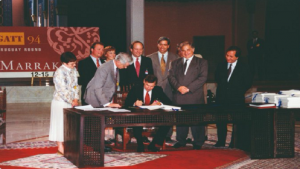This week marks 25 years since the establishment of diplomatic relations between Palestine and South Africa. At a meeting on 14 June 1994, then President Nelson Mandela and chairperson of the Palestine Liberation Organisation (PLO) Yasser Arafat agreed to open a Palestinian embassy in Pretoria. They decided on Arafat’s adviser on African affairs Salman al-Hirif to be the ambassador.
Full diplomatic relations between the two countries were formalised on 15 February 1995, with South Africa’s first representative to the Palestinians National Authority taking up office in August of the same year in Gaza.
The move cemented the governing African National Congress’ (ANC) long-time commitment to the cause of the Palestinians. The relations continued to grow stronger, with Arafat undertaking his first state visit to the country on 11 August 1998.
Although South Africa received backlash over this from some among the Jewish community, Madiba had previously explained that solidarity with the Palestinian people didn’t mean the governing ANC didn’t care about the struggles of the Israelis. While he had professed the legitimacy of Zionism as Jewish nationalism, Mandela’s main concern in dealings with Israel’s government was the advancement of the peace process and the well-being of the Palestinian people.
Arafat’s PLO supported the ANC during apartheid. It trained and equipped ANC fighters, while the Israeli government bears the legacy of having supported the apartheid government. The relationship between the South African government and Palestine is still strong. In 2018, Pretoria downgraded its Israeli embassy to a liaison office. The move was in retaliation to clashes between Israeli military forces and protesters during which at least 52 Palestinians were killed. The controversial decision was also in line with a resolution the ANC took during its 2017 national conference in Nascrec, Johannesburg. It sought to draw attention to Israel’s settlement policy.
Watch video of the Navy welcoming Arafat to the country by playing the South African and Palestine national anthems:
Special Committee Against Apartheid dissolved
Another major event this week was the adoption of the final report of the United Nations Special Committee Against Apartheid by the General Assembly and the Security Council on 14 June 1994.
The Special committee was dissolved after the report was adopted.
This paved a way for South Africa’s re-admission to the United Nations after the country was suspended from participating in the work of the world body for its oppressive policies on 12 November 1974.
The Committee was behind international campaigns against the oppressive regime. It pushed for economic sanctions against the apartheid government, notably proposing an oil embargo in 1963. While many Western powers and other major trading partners of South Africa opposed the UN’s request for sanctions and declined membership on the Committee, it finally realised its ideal when South Africa held its first-ever democratic elections on 27 April 1994.
Watch Mandela’s address to the United Nations in New York after his release from jail in 1990:
SA re-joins the Commonwealth
Another major event this month was South Africa re-joining the Commonwealth on 1 June, 1994.
South Africa, a founding member of the Commonwealth, withdrew its membership in 1961 after becoming a republic.
A move some political experts say was a matter of jumping before being pushed as the association was against apartheid policies.
During the anti-apartheid struggle, the Commonwealth played an important role in lobbying for the end of institutionalised racism. It is credited with having contributed to the mounting international pressure placed on the National Party’s oppressive administration.
In recognising the association’s role during these years, former President Thabo Mbeki once referred to it as a “community of nations painstakingly brought massive pressure internationally, in many different ways to bear on the racist and repressive state.”
Since re-joining the Commonwealth, SA has been an active participant in the various governing bodies and ministerial meetings of the association. She is one of the major voluntary contributors to the Commonwealth of Learning (COL) and occupies a seat on its Board of Governors. In return, South Africa too has benefited from the membership of the association through various development initiatives like the Development of Mpumalanga Province Tourism Growth Strategy and the Bench-marking of South Africa’s Fruit Export Trade Logistics Chain.
Political commentators have criticised the association for not being at the forefront of international politics. However, supporters say it’s an important organisation that not only unites and serves its member countries, but also provides a lobby on global issues.
South Africa will be the first African country to host Commonwealth Games at the Moses Mabhida Stadium in Durban in 2022, more than 85 years since the event was first held in Canada. The tournament takes place every four years.
Watch video on Africa’s response to Durban hosting the games:
SA joins the NAM
Another milestone to note for democratic South Africa leading to the month of June was its joining of the Non-Aligned Movement (NAM) on 31 May 1994. The movement advocates for developing countries against world superpowers. It was founded in 1961 to push for decolonisation.
The NAM has no formal constitution or permanent secretariat. All its members have equal weight and decisions are taken by consensus in the Summit Conference of Heads of State, which is held every three years.
The NAM is the second largest international body, after the United Nations. It has 53 members from Africa, 39 from Asia, 26 from Latin America and the Caribbean, two from Europe, as well as 17 observer countries and 10 observer organisations.


